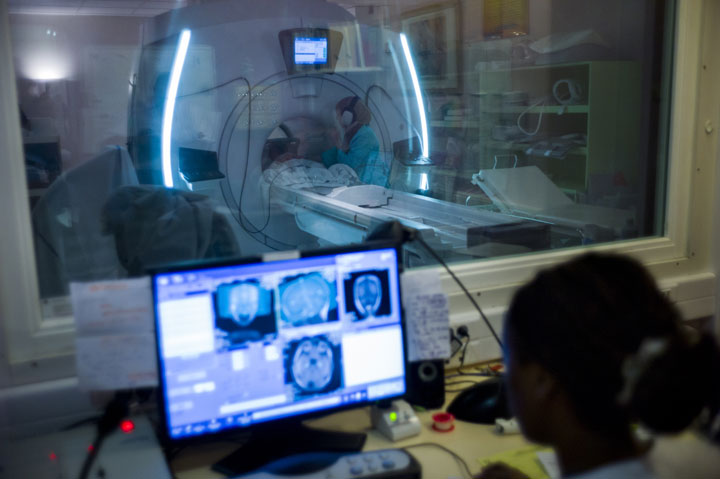TORONTO – Imagine banging your head, and suddenly speaking with a Scottish, Russian, or Chinese accent.

It may sound like something to laugh at, but for Sharon Campbell-Rayment, it’s no laughing matter.
On July 11, 2008, Campbell-Rayment, a self-described “Type-A” personality — someone who spoke publicly three times every Sunday at church, who held three jobs, who taught herself the Hebrew alphabet — was out teaching girls horseback riding at a camp she ran.
It was the one time she didn’t wear a helmet.
Her horse, Malachi, became spooked and threw her off; she fell and hit her head on the ground — twice.
READ MORE: Survival rates improve for patients with brain injuries
She ended up with small bruising of the brain, but MRIs showed no major brain injury. She took the time to heal and thought that would be the end of it.
Except it wasn’t.
Something wasn’t right.
“I’d go into a store, and people would overwhelm me with conversation, or the noise and the lights,” Campbell-Rayment told Global News.
Ten days after her accident, she woke up unable to speak at all.
It took Campbell-Rayment almost a year to regain her speech. And when she did, she sounded more like Sean Connery than an Ontarian.
“As the speech therapist worked with me, she said, ‘You have an accent. Did you previously?’ And I said, ‘No, actually.'”
Campbell-Rayment went to Windsor Regional Hospital and did some neurolinguistic testing. The doctor came up with the diagnosis of foreign accent syndrome. It’s an extremely rare syndrome, with only about 100 cases reported worldwide.
VIDEO: Sharon Campbell-Rayment speaks about her injury
Five years later, Campbell-Rayment said that people still think she should “be over it.” But the brain injury persists in her daily life. Decisions are harder to make; when she’s tired, her accent becomes thicker, and her brain processes things more slowly.
What is happening in the brain
Asked why she uses phrases like “wee” in her conversation (and she uses it a lot), Campbell-Rayment couldn’t explain it.
“I laugh and tell people that a wee ancestor from my previous ages has resurrected with me to help me out in this time,” she said.
But Karin Humphries, an associate professor at McMaster University who has studied a similar case, said that it’s not all that unusual.
“People change how they speak all the time.” she told Global News. “You’re talking to somebody with a different accent, and people find themselves unconsciously copying them.”
“As speakers and listeners, we’re incredibly sensitive and reactive to people around us.”
Humphries said that most of the cases of foreign accent syndrome stem from acute brain injuries, either from trauma to the head or a stroke. There has been an incident of someone with multiple sclerosis suffering from the syndrome.
Because the cases are so few and far between, it’s not quite clear what is happening in the brain to cause the syndrome or what exact part is affected.
VIDEO: Mystery as Woman woke up with a Chinese accent
“It’s been a bit elusive,” said Humphries. “It seems that for this, it’s much harder to say. There’s not nearly consistent a pattern of damage that leads to this. It has to be, overall, fairly mild…It’s got to be something really pretty subtle for the language to sound normal, but just a little bit off.”
Campbell-Rayment and her husband visited Scotland a few years ago when one of her two daughters went to England to study. She recalled asking the owner of a bed and breakfast for directions when they were staying in Inverness.
“She said, ‘For sure, darlin’ you know where it is, because your accent tells me you’re from Inverness.’ I said to her, ‘That’s really grand to know where I’m from.”
Humphries said that the “foreign” part of the speech may be a perception issue on our part, rather than someone having an actual regional accent.
“There are certainly some cases where so much of it is in the ear of the beholder.”
“The way we listen, the way our ears work, is we categorize sounds,” she said.
If someone with foreign accent syndrome was analyzed intensely by a linguist, put under different studies and tests, the linguist may actually be able to characterize more precisely the different sounds and find that it wasn’t regional at all.
Campbell-Rayment has started a website to help others cope with post-concussion issues, such as foreign accent syndrome. She is also coming out with a book, entitled Falling Into the Rhythm.
“I know how frustrated and angry and how depressed I became, and I wanted to be able to help other people. Just that funny feeling of just not feeling right and people saying, ‘You should be over this.’ It’s easy for others to say.”
Perhaps surprising to some, Campbell-Rayment finds comfort in her horse. She enjoys the quiet moments with Malachi and such simple tasks as grooming.
“It probably took me two years of counselling to understand that I wasn’t going back to who I was. And I finally came to appreciate who I am.”


Comments